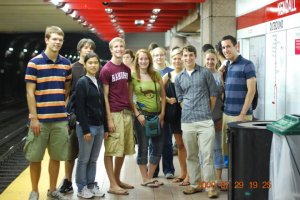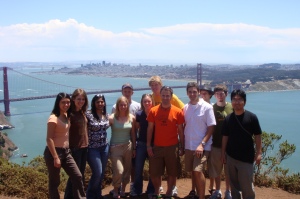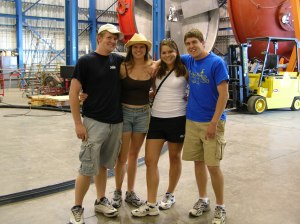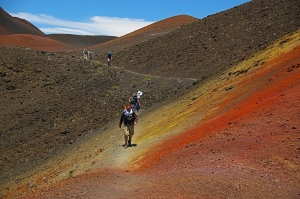
The infamous SAO REU 2009! Featured in this picture are astrobite authors Ian Czekala (blue/orange stripes on left), Dan Gifford (crimson shirt middle), Nathan Sanders (grey button-up right), and Evan Schneider (grey shirt in back right)
At the most recent AAS meeting in Boston, I had the chance to reunite with several of my fellow graduate students who participated in the summer REU at the Smithsonian Astrophysical Observatory. Being in Boston brought back many great memories of that summer, and I feel that sharing more about these great opportunities is important. I also feel this astrobite will come at a good time as this is when many of the REU programs are in their first or second week, and the participants are still trying to figure out what the program expects out of them, but more importantly, what they should expect out of themselves. I’ll start with a short review of what an REU is for those that missed out on applying this year, and then discuss why they are so important and how you can make the most of your own REU experience!
REU stands for Research Experience for Undergraduates, and they are funded by the National Science Foundation (NSF). These programs are aimed at students going into the summer between their 2nd-3rd year, and more so in their 3rd-4th year, who are interested in conducting scientific research at a graduate level. Each institution that hosts an REU program is free to make the experience unique, and that is exactly what happens. However, there are many commonalities no matter where you go. Each student works with an advisor who has planned a project for them ahead of time that can be finished in the length of the program (typically around 10-12 weeks). Not an astronomy major? Don’t go to an Ivy League school or even a “Research 1 school”? Haven’t taken any astronomy classes or know a programming language? No worries! Schools that have astronomy REUs accept students with all kinds of academic backgrounds and skill levels. The whole idea is to give you a chance to explore the field at a deeper level and see if graduate school in astronomy is something you would like! Now, there are a limited number of these REUs available, so the competition is great. Many schools look mostly for students who have research experience at some level in some field, however every program typically accepts one or more students from outside the field who have a great interest. In fact, applying to these programs is a lot like applying to graduate school, and you will be competing for spots with a lot of the same people as well!

The NASA Ames Academy for Space Exploration group in 2008. Featured in this image is astrobite author Courtney Dressing (dark blue shirt middle).
So why are these programs so valuable? Besides being a blast and having the chance to live in a different part of the country for a while, they give you a clear window into the life of graduate school and astronomy in general. I arrived at the SAO from an institution with 2 astronomers, so you can imagine the shock and excitement I felt being surrounded by so many great minds all in one place! At these REUs, you will go to colloquia, get to know your fellow students who do research at other institutions around the globe, and meet their advisors in the program. When application time rolls around for graduate school, knowing what kind of research you want to do (and don’t want to do!) can go a long way in improving your application. Astronomy is still a 2-degrees of separation field, and networking is always stressed to graduate students as an important part of their careers. The people you meet will review your papers, be on grant committees, and maybe hire you one day. The importance of making a good impression and getting your name out there cannot be understated. Turns out you can start now as an undergrad, and any type of research (but especially an REU) is an excellent way to get your name out to many institutions at one time.

Astrobite author Susanna Kohler (second from left) and her fellow REU students from Sunspot's National Solar Observatory on a field trip to the Large Binocular Telescope in 2006.
So what should your expectations be for yourself? Is it reasonable to expect to publish what I do this summer? Is it bad if I don’t? An REU for most people is a once in a career thing. Some are lucky and able to fit in two before they move on to graduate school. Making the most out of your experience is actually fairly easy given the position you are in. You are surrounded by some of the smartest, most driven undergrads who also want to make the most out of their time, you are under a deadline of sorts (length of the program), and you are usually given a lot of tools and tutorials by the program to help you succeed. Some programs require you to write a paper that could be published, while others only require you to do the research. Almost every program will have you give a 10-15 minute talk about your work at the end of the summer to the department… A great opportunity to make an impression!! Now, any time you have a chance to publish a paper, it is important to make an effort to do so; however, if you aren’t able to with the work you do at the REU, don’t worry! Publishing a paper takes a lot of work and time. Usually more time than the typical undergrad has, so it also comes down to your advisor whether the work you do gets published. Sometimes your work will not be published on its own, but be tied up into a bigger project that will earn you a spot on the author list of a larger collaboration!
Some people get tied up in the whole paper thing, but really, the best thing you can do on your REU to advance your career as an undergrad is keep your ears open and learn. Learn a new programming language… Read a new paper every day either on your research or on one of your peers research… Talk with your peers about what they are learning and finding… Make an effort to meet the “big wigs” in the department and have a chat with them about their research (even if they don’t remember you, you will remember what they say)… Take what you learn from the papers you read and try to copy one of their plots with your own data (even if your advisor hasn’t asked you to)… Become really proficient at vi, emacs, or another text editor… but maybe even more important…
Have a fun time!!!! Really get to know your new friends in the program. These are people you have the chance to form lifetime friendships with, co-author papers, and invite to talk at your own grad institution. You also might be writing a blog with them someday….. For those of you just starting your REU this summer, I wish you the best of luck, and I hope you really fall in love with astronomy. For those of you who didn’t have the chance to apply this year, application time is usually December/January-ish, but don’t forget that what you do this summer will play into whether or not you find yourself at one next summer! The pictures are from some of our REU experiences.


The REU program is very good. It should be noted that there is a similar program called Research Experience for Teachers (RET) which brings in high school science teachers. Many (but not all) REU sites also host RETs. I did the RET at the National Radio Astronomy Observatory in Green Bank, West Virginia when I was teaching and recommend teachers look for a program.
Thanks for mentioning that! It is important to realize that REUs are not the only summer internship opportunities around, and looking at all the different options will help you land in a place you will enjoy.
It is great to read this article before I start my REU this summer. Like it!